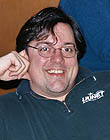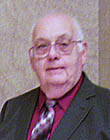|
|
 
|
|
Author
|
Topic: What is a "loop system" (hearing impaired)?
|
|
|
|
|
David E. Nedrow
Master Film Handler

Posts: 368
From: Columbus, OH, USA
Registered: Oct 2008
|
 posted 12-23-2010 11:45 PM
posted 12-23-2010 11:45 PM





Mike,
When we did our renovations, I installed the induction loop wire around the auditorium before the wall treatments were installed. Of course, I don't have the money yet for the rest of it yet. ![[Wink]](wink.gif)
The nice thing about an induction loop system is that any hearing aid, or cochlear implant, with a telecoil will be able to receive the audio. They also have induction loop headsets for people without properly equipped hearing aids. That way, you don't have to maintain two systems, once the loop is installed.
They have some information (not technical) at HearingLoop.org.
Look at Vivid Acoustics and Harris Communications for actual systems. You're generally looking at around $1000 for the whole thing, including induction wire.
Here's a good overview at Marc's Technical Pages.
Oh, the drawback to induction loops -- though it doesn't affect single-screeners like us -- is that the sound can "leak" to adjacent auditoriums, assuming those adjacent spaces are also looped. Note also that a hearing aid customer in an adjacent, non-looped room may tune in the looped auditorium audio thinking they are getting the soundtrack for the theatre they are in.
-David
| IP: Logged
|
|
|
|
|
|
|
|
|
|
|
|
David E. Nedrow
Master Film Handler

Posts: 368
From: Columbus, OH, USA
Registered: Oct 2008
|
 posted 12-24-2010 11:31 AM
posted 12-24-2010 11:31 AM





quote: Mark H.
A local (now closed) 5 screen cinema had plans at the entrance to each screen showing where to sit to get best reception for the induction loop. They may have planned the loops so as to reduce leakage between screens.
They may have been planning on just laying the loop around a small set of centrally located seats. That way, they could direct people to sit in that area, but the coils would be far enough from each other that the leakage wouldn't happen.
I would think that if I were hard of hearing, I'd rather use the loop system, strictly from a hygiene perspective.
Another drawback to coil, in a theatrical sense, is that it's mono only.
We have IR emitters here, but the previous people destroyed most of the needed equipment to drive and use it. They had a roof leak that went unfixed for some time, and, in addition to rotting the masking fabric, it leaked on the transformer/amplifier and ruined it. They also left batteries in all of the headsets, which leaked all over the interior boards in them.
| IP: Logged
|
|
|
|
|
|
All times are Central (GMT -6:00)
|
|
Powered by Infopop Corporation
UBB.classicTM
6.3.1.2
The Film-Tech Forums are designed for various members related to the cinema industry to express their opinions, viewpoints and testimonials on various products, services and events based upon speculation, personal knowledge and factual information through use, therefore all views represented here allow no liability upon the publishers of this web site and the owners of said views assume no liability for any ill will resulting from these postings. The posts made here are for educational as well as entertainment purposes and as such anyone viewing this portion of the website must accept these views as statements of the author of that opinion
and agrees to release the authors from any and all liability.
|

 Home
Home
 Products
Products
 Store
Store
 Forum
Forum
 Warehouse
Warehouse
 Contact Us
Contact Us




 Printer-friendly view of this topic
Printer-friendly view of this topic








![[Wink]](wink.gif)






